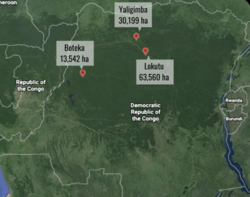Collective communiqué | 20 November 2023
PHC Congo: European development banks must be held accountable for broken mediation process
It has now been more than five years since nine communities in the Democratic Republic of the Congo (DRC) filed a complaint with the International Complaint Mechanism (ICM) of the German, French and Dutch development banks. The complaint centred around land conflicts with the oil palm plantation company, Plantations et Huileries du Congo (PHC, formerly owned by Feronia Inc). Unfortunately, the mediation process resulting from this complaint is set to collapse, unless strong measures are taken to ensure adequate, safe, independent and truly inclusive participation of the local communities and their representatives.
The complaint filed by villagers from the areas of Lokutu and Boteka in 2018 dealt with three issues: land conflicts, violence against villagers, and the lack of transparency. Over the past five years, none of these issues have been resolved, but have instead only grown worse.
The villagers who filed the complaint continue to be routinely arrested, harassed and intimidated by security guards of the company and a detachment of national soldiers and police that was sent to support them. Testimonies and declarations from the villagers attest to an alarming level of brutality, with security guards and soldiers vandalising people’s homes and robbing them of their money and valuables, with impunity. This repression is taking place despite PHC and the DRC authorities having formally agreed in a mediation session in March 2023 to ensure the release of villagers held in prisons and to stop all violence and criminalisation of villagers. Yet, to this day, dozens of villagers continue to languish in jails under dubious accusations of theft from the plantations. As long as this repression continues to escalate, community members will not feel safe participating in the mediation process.
Another critical failure in the mediation process is that the company and the government have refused to provide copies of the relevant land documents. Without these documents it is not possible for the mediation to resolve the century-old land conflict at the heart of the tensions between the company and the community and at the centre of the complaint filed half a decade ago. The tripartite commission formed under the mediation process to investigate the legitimacy of the company’s land claims has therefore been unable to carry out its mission. PHC has simply refused to comply with the mediation team's request for the PHC to provide these documents. Nevertheless, the affected villagers, with assistance from the Congolese human rights organisation RIAO-RDC, have provided the ICM panel with detailed information about how PHC created new survey markers and expanded its occupation of their lands between 2011-2015 without consulting them. During that period of time, PHC was receiving millions of dollars in funding from European development banks.
In November, PHC announced massive expansion plans to increase its palm oil production capacity from 80,000 tonnes annually to two million tonnes in seven to eight years. It remains unclear where the company plans to acquire the necessary amount of land to facilitate an expansion of this scale. In a context where PHC has refused to provide documentation for its current land claims, this announcement makes it even more obvious that the company has no respect for the ongoing mediation process and for the concerned Congolese communities.
Despite the lack of any serious investigation into the land issues, the ICM panel has already indicated that a final mediation session will take place in January 2024 in Kinshasa between the company and a selection of village leaders, accompanied by RIAO-RDC and government officials. For the villagers and the national and international civil society organisations following the process, the complaint was filed to resolve the legacy land issues, because land is a crucial asset for villagers to improve their livelihoods and their land rights need to be respected. A few social projects or compensation cannot address these rights violations and the mediation fails if there is no resolution of the land issues.
A third issue undermining the mediation process is with the ICM's financing. It is unclear how much the ICM has received for the process and how it has allocated funds so far towards the participation of the different parties. RIAO-RDC indicates that they have had to advance funds for agreed items of the budget without certainty of being reimbursed.
The ICM, the development banks and their host governments in Germany, the Netherlands and France, as well as Belgium and the UK, need to urgently assure an effective complaints mechanism with adequate and transparent funding, resources and access to land documents, as well as security for the participating villagers and their representatives, including the cessation of arrests and harassment and the immediate liberation of villagers from prison. Otherwise the ICM will not be able to address the rights violations of communities impacted by companies financed by development banks, which will show once again how the banks are not able to prevent and repair harms when financing projects with legacy land conflicts.
We also insist that evidence already provided by the communities makes it clear that funding from development banks to PHC (and its owner at the time, Feronia Inc) facilitated an illegal expansion of PHC plantations and land claims. The development banks, at a minimum, have a responsibility to ensure that the lands are immediately returned to the communities and that the affected villagers are remediated for related violations of their human right to food and compensated for the loss of their lands and the negative affects they have suffered over past decades as a result.
Signed by:
RIAO-RDC
Both ENDS
CNCD-11.11.11
Entraide et Fraternité
FIAN Belgium
FIAN Germany
GRAIN
Milieudefensie
National Synergy of Peasants and Residents of Cameroon (SYNAPARCAM)
Oakland Institute
Oxfam Novib
Rainforest Rescue
Struggle to Economize Future Environment (SEFE)
The Corner House
World Rainforest Movement












